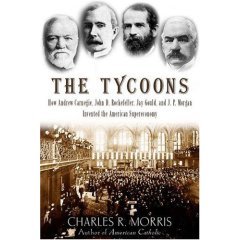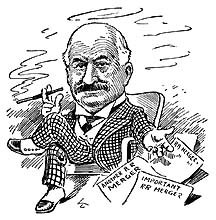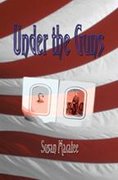

WELCOME to a new series on the Tycoons,
the fascinating men who created today's corporate world. Their heyday matched Victoria's reign almost exactly - although some say their age ended when the Titanic sank in 1912.
The Tycoons created the industrial system that gave the United States the most powerful and dynamic economy in the world. Masters of organization, they were visionaries and risk takers who thought and acted on a grand scale.
The fortunes of today's billionaires pale in comparison to the wealth of these men. As a percentage of the US economy, no other American fortune - not even Bill Gates' or the late Sam Walton's - would even come close to John D. Rockefeller's.
In the coming weeks I'll post articles on seven of these larger-than-life Victorian Americans. From different backgrounds, their lives were varied, exciting and colorful. I hope to offer some insight into each man.
Part 2: John Jacob Astor (1763-1848) The first millionaire in the US, he made his fortune in fur trading (establishing Astoria while he was at it) and real estate. We'll cover not only the founder of the dynasty, but John Jacob Astor IV (1864-1912) the richest millionaire to go down on the Titanic.
Part 3: Andrew Carnegie (1835-1919) This steel magnate founded what became US Steel and then founded libraries all over this country. He loved his native Scotland and built a Victorian mansion there in the ruins of an old castle - thereby giving the world (and Madonna and Guy Ritchie) the famed Skibo Castle - the most romantic wedding site imaginable.
Part 4: Henry Clay Frick (1849-1919) This American industrialist was
considered ruthlessly anti-union. His partnership with Carnegie, in what became US Steel, is chronicled in the book, MEET YOU IN HELL. During the strike at the Homestead Steel Mill, Carneigie played golf in Scotland while Frisk toiled in the mine office. An anarchist broke in and shot Frisk twice in the neck and stabbed him several times with a poisoned dirk. He received medical attention in his office and finished the work day.
Part 5: Jay Gould (1836-1892) He was a soft-spoken man, called the DARK GENIUS OF WALL STREET. He made a fortune in northeastern railroads and was able to buy out Vanderbilt's shares in the Erie Canal. He controlled Western Union, New York's elevated rails and dabbled in gold futures. His reputation suffered when he posted bond for Boss Tweed.
Part 6: John Pierpont Morgan (1837-1919) Unlike the others, J. P. Morgan was born into wealth. He attended fine schools in Boston and, at 20, he graduated from a German University. The most famous tycoon in his day, his name is still linked with American finance and banking. Well respected, he worked to keep the financial world afloat. He once kept the US economy from sinking in a Great Panic by convincing millionaire friends and foes to agree to underwrite the government for a time. He financed the work of Thomas Edison and made the use of electricity a practical reality.
Part 7: John D. Rockefeller (1839-1937) When he died at 98, he was worth $1.4 billion in 1937 dollars.
For many years (the good old days) he virtually controlled the US oil supply. His Standard Oil Company was renamed ESSO in the 20th century and updated to Exxon. Today it's Exxon-Mobil.
By 1905, his worth was $240 million, and in that same year he gave away $13.6 million. Five years later, he gave Standard Oil stock worth $50 million to start the Rockefeller Foundation. As he grew older, he worked as hard giving away money as he'd worked acquiring it.
Part 8: Cornelius Vanderbilt (1794-1877) He created the first fortune topping $100 million, but he was a ruthless, unpleasant, ill-educated man who never learned to read and could only spell words phonetically. Born on Staten Island, he borrowed a $100 when he was 16 to buy a small boat, and then hired himself out as a ferry sevice to New York City. He acquired the name Commodore when he got into the steamship business. He started buying railroad stock and soon revolutionized the railroad industry. He was coarse, profane, tobacco stained and snubbed by polite society. Amazingly, the name Vanderbilt has a very genteel ring today.
Watch for upcoming episodes featuring your favorite Tycoons in the VICTORIAN FASTLANE!
SOURCES:
THE HOUSE OF MORGAN
An American Banking Dynasty and the Rise of Modern Finance.
By Alan Chernow
THE TYCOONS
How Andrew Carnegie, John D. Rockefeller, Jay Gould and J. P. Morgan Invented the American Super Economy.
By Charles R. Morris
DARK GENIUS OF WALL STREET
The Misunderstood Life of Jay Gould, King of the Robber Barons.
By Edward J. Renehan, Jr.
MEET YOU IN HELL
Andrew Carnegie, Henry Clay Frick, and the Bitter Partnership That Transformed America.
By Les Standiford
CITY JOURNAL:
The Robber Barons' Bum Rap
By Maury Klein, Winter 1995









2 comments:
Fascinating reading. I had never heard of Frisk. Thanks for researching these individuals who changed America.
Very unique. I'll have to add you to my blog roll too. I love material based on any sort of history.
Post a Comment